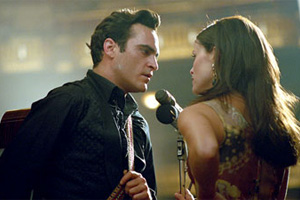|
 |
Walk the Line (2005) 20th
Century Fox, 2 hrs. 15 mins.
Starring:
Joaquin Phoenix, Reese Witherspoon, Robert Patrick, Ginnifer Goodwin
Directed by:
James Mangold |
|
Last year’s Oscar-winning Ray proved
to be an exceptional biopic about the late great American musical icon Ray
Charles and the triumphs and tragedies that drove him and established his
amazing abilities as a successful recording artist. Well, the same durable
formula can be applied to co-screenwriter/director James Mangold’s somber
yet sensational tribute to Johnny “The Man in Black” Cash in Walk the
Line. Both Cash and Charles had remarkable parallel experiences in that
they both were Southern-bred geniuses influenced by gospel music while
undergoing an emotional shock in losing their close siblings to horrific
accidental deaths. Of course we cannot forget the fragile marriages,
habitual womanizing and well-chronicled bouts with substance abuse.
Nevertheless, nobody walked the line so brilliantly and bewilderingly like
Johnny Cash.
Interestingly, Mangold squeezes some of the year’s best performances out
of Joaquin Phoenix and Reese Witherspoon as Cash and his curvaceous
countrified romantic interest June Carter Cash. Not only does the film’s
leading tandem embody the mood and spirit out of the late country crooners
but Phoenix and Witherspoon are convincing and courageous enough to sing
the songs of their real life counterparts. Some may have viewed this as a
gamble but the payoff is sweet as Mangold receives tremendous
inspirational input by his impeccable actors. No doubt that Phoenix and
Witherspoon are deserving of Oscar nods for effortlessly wearing the
soulful and tortured skins of the first couple of country music.
Walk the Line features the humble beginnings of Cash (Phoenix) and
captures the tormented singer through random high-paying concerts,
charitable prison shows, selective heated exchanges with his suffering
wife, various carnal stints with appreciative groupies and tangling
dangerously with assorted pills and bottles of booze. The main
preoccupation of Cash’s tainted psyche was in pursuing the often-married
country cutie June Carter (Witherspoon), an elusive witty woman that
triggered an inexplicable passion in the aspiring singer.
The film opens up with a “Rosebud” moment from Citizen Kane. While at the
Folsom lock up facility waiting to entertain the enthusiastic prisoners,
Cash stares ominously at a metal saw. Of course this tool represents some
bittersweet flashback memories with Cash as a youngster playing around
with his older brother until a sawing accident claimed the life of little
Johnny’s beloved sibling. Cash’s sharecropping father (played by an
unrecognizable Robert Patrick) feels the pain and decides to pin his
favorite son’s demise on poor Johnny with the ill-advised admission that
“God took the wrong son”. This shocking indiscretion would leave an
everlasting strained feeling between a damaged Johnny and his hurtful
father.
Johnny Cash, much like any other human being, needed the desperate
affection and approval from his parents and anything that he accomplished
seemed to be futile in the eyes of Cash’s critical Papa. Whether it was
joining the air force, marrying his woman Vivian (Ginnifer Goodwin) and
starting a family situated with four daughters, working odd jobs or
embarking on a career in music, Johnny just couldn’t get an even break
from his cynical father.
Cash is in a quandary because his real passion was becoming a devout
gospel singer. But Vivian wants him to get serious about providing for
their growing family and pleads for her unrealistic husband to seek solid
employment in her father’s business. Johnny isn’t buying this angle and
insists on making his own way in the music industry even if it kills him.
A chance meeting with well-known music producer Sam Phillips (Dallas
Roberts) ends up rather iffy at first as Cash tries to sell him on his
notable taste for gospel music. Unfortunately, Phillips isn’t very
thrilled with Cash’s product until Cash is convinced to rely on his own
songs that speak more to his experiences. The rest, as they say, is
history.
Finally, Johnny Cash becomes a noteworthy name when he is allowed to go on
tour with Phillips’ other upstart singing stars that included Elvis
Presley (Tyler Hilton), Jerry Lee Lewis (Waylon Payne) and naturally June
Carter whom he becomes obsessed with hooking up. Basically, the film
follows the gradual rise and popularity of Cash and Carter through
countless stage engagements. When Johnny yearns to be closer to June, she
pulls back and resists his offering for loving. It’s crystal clear that
Johnny or June cannot remain faithful to their spouses (well, Johnny can’t
although June’s conflict is that she keeps falling for the wrong man).
June is afraid to succumb to Johnny because she does care for him deeply
but she’s had her share of caretaking in supporting disappointing, broken
men. Can Johnny get hold of his demons and convince June that he’s the
real deal—the ultimate love of her life? More important, will Cash find
peace with himself and rescue whatever emotional malaise he holds for his
unflinching father?
Mangold does a superb job in fleshing out Johnny Cash as a sympathetic
soul searching for that respectable pinnacle of accomplishment. He’s a
walking wound and needs a companion such as the trusty yet flawed June to
give him the psychological strength he needs to hold his head up high. As
for the music, it’s moody and infectious and acts like the reliable glue
that binds the Cashes together spiritually. One doesn’t have to embrace or
admire country music to appreciate this frothy and formidable biopic about
yet another artist that paid the price for his talents.
Again, the backbone to Walk the Line is the complex and nuanced portrayals
that Phoenix and Witherspoon unselfishly give while channeling the
pioneering pair and the thought-provoking tunes that they left behind as a
reminder of their revered artistry. In a fortunate year where reflective
biopics ruled the big screen, Mangold’s Walk does more than tip toe to the
legendary aura of Johnny Cash—it stomps its feet more pleasingly than an
overactive Baptist preacher during Sunday services. |